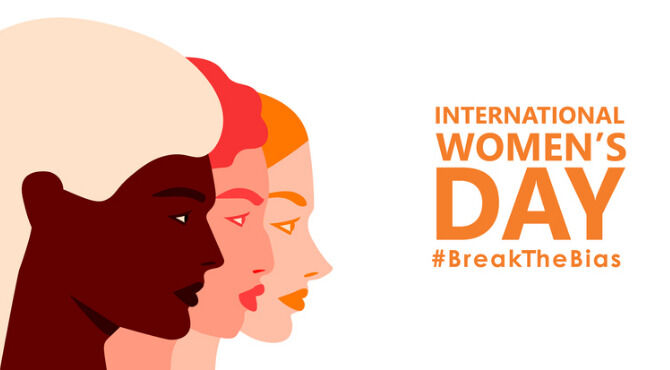Break the Bias: International Women’s Day 2022
International Women’s Day 2022 is on Tuesday 8 March. It is an opportunity to act, improve opportunities and rebuild post-pandemic workplaces without bias for the benefit of everyone.

Read more related news and features from Relocate Global
- Partner employment access – the triple win
- Think Women: Make the pandemic juggling act work for you
- Real workplace challenges for women remain
Why is recognising bias important?
As well as being the right thing to do, acknowledging and addressing bias, conscious or otherwise, has a critical role in furthering the diversity, equity and inclusion agenda so vital to building more sustainable, responsible and successful businesses.Research into 1,000 companies in 12 countries by management consultants McKinsey & Company found gender-diverse companies outperform their national industry averages on profitability. Another study by Catalyst, a non-profit community working globally to help build workplaces that work for women, found that firms with more women in management positions enjoy 35 per cent more return on equity (ROE) than firms that lack gender diversity. To make this happen in more companies, bias means taking action to learn what we don’t know. This requires effort, engagement and buy-in to do something about the findings.Identifying bias and building buy-in
Speaking at the CIPD’s annual conference and exhibition in November, Steven Atkins, Global Analytics Enablement Director at splashHR, a people analytics platform, said the driver for addressing discrimination, diversity gaps and changing hearts and minds “has to be ‘show me what I don’t know, even though I think I know about it’.“Then when I see that information, to embrace it and adapt to it. Without information backing up all the wonderful things everyone is talking about, we are not going to make that mandate for change. This is where D&I discussions can help foster positive change.”For fellow CIPD panellist Katherine Gansallo, Diversity and Inclusion Director at the London Stock Exchange Group (LSE), this has been the case around adopting, for example, more flexible working patterns in the international organisation, which employees around 25,000 people in 17 countries.“We are really trying to look at systemic change when it comes to our D&I objectives and really looking at making sure data is key in driving some of the initiatives we are working on. “We are focused on gathering as much of that as possible to really inform the decisions that we make, and make sure we are not only focusing purely on different underrepresented groups, but also making sure that where we have bias in the system, we are mitigating it and pulling it out and making some real change.”Overcoming stigma
“For us, the pandemic is an interesting time because thinking just about the LSE [which acquired and merged with financial market information provider, Refinitiv, in 2021], it’s quite old in its way of thinking,” explained Katherine Gansallo, hihglighting how individuals and teams can challenge, spearhead change and drive the inclusion agenda at work for mutual benefit. Prior to the pandemic, research showed that flexible working carried with it a stigma, especially for women. A 2019 survey of 1,600 civil servants by the Global Institute for Women’s Leadership at King’s College London found a quarter felt their line manager viewed their flexible working as a negative. Over a third also said they felt they needed to put in extra hours to show their commitment.“There were some managers who were very keen to say there is no way we could do remote working without being present in the office,” continued Katherine Gansallo. “The reality of that is that this pandemic has been a great opportunity to really shake things up and showed us that we absolutely can. “It has allowed us to really challenge people around ‘why did we say we couldn’t work that way’? It’s a great opportunity to encourage people who need different modes of support."Rebuilding the world of work without bias
International Women’s Day is therefore a chance to amplify and reinforce the work that is already happening in purpose-driven organisations to identify and respond to workplace bias. The global movement has published a range of resources and guides so employers of all sizes from around the world can get involved and raise awareness in support of gender equity.You can also access Relocate Global’s wealth of information from our impactful International Women’s Day events over the years – the largest and highest profile celebrations in our sector.Find out how to join us as we celebrate diversity and inclusion in our leading annual Relocate and Think Global People Awards and Think Global People: Future of Work Festival in June, as well as year-round through our multimedia platform.Inspired and keen to get involved and tell us about your work to #BreaktheBias? We’d love to hear from you!If you have a people-centred approach to driving success across your organisation and understand the importance of wellbeing in all its forms for talent to flourish, then why not enter the Think Global People and Relocate Awards. There are ten categories to choose from. Join us on 9 June for the results and the Future of Work Festival.
Read more HR news here.
Subscribe to Relocate Extra, our monthly newsletter, to get all the latest international assignments and global mobility news.Relocate’s new Global Mobility Toolkit provides free information, practical advice and support for HR, global mobility managers and global teams operating overseas.
 Access hundreds of global services and suppliers in our Online Directory
Access hundreds of global services and suppliers in our Online Directory©2026 Re:locate magazine, published by Profile Locations, Spray Hill, Hastings Road, Lamberhurst, Kent TN3 8JB. All rights reserved. This publication (or any part thereof) may not be reproduced in any form without the prior written permission of Profile Locations. Profile Locations accepts no liability for the accuracy of the contents or any opinions expressed herein.



































